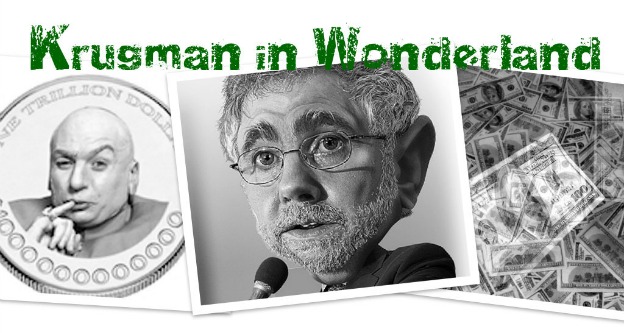Krugman Supports Capital Controls
In reading Paul Krugman for more than a decade, it seems that he has established a firm ideological pattern: Markets evil, government good. Thus, he has decided the solution for the crisis in Cyprus: capital controls.
Now, Krugman will not admit that capital controls are essentially an act of police-state theft, although that is exactly what they are. Instead, he promotes capital controls as the epitome of “responsible” government trying to beat back the evils of capitalism. He writes:
Whatever the final outcome in the Cyprus crisis — we know it’s going to be ugly; we just don’t know exactly what form the ugliness will take — one thing seems certain: for the time being, and probably for years to come, the island nation will have to maintain fairly draconian controls on the movement of capital in and out of the country. In fact, controls may well be in place by the time you read this. And that’s not all: Depending on exactly how this plays out, Cypriot capital controls may well have the blessing of the International Monetary Fund, which has already supported such controls in Iceland.
That’s quite a remarkable development. It will mark the end of an era for Cyprus, which has in effect spent the past decade advertising itself as a place where wealthy individuals who want to avoid taxes and scrutiny can safely park their money, no questions asked. But it may also mark at least the beginning of the end for something much bigger: the era when unrestricted movement of capital was taken as a desirable norm around the world.
But it gets better:
It wasn’t always thus. In the first couple of decades after World War II, limits on cross-border money flows were widely considered good policy; they were more or less universal in poorer nations, and present in a majority of richer countries too. Britain, for example, limited overseas investments by its residents until 1979; other advanced countries maintained restrictions into the 1980s. Even the United States briefly limited capital outflows during the 1960s.
Over time, however, these restrictions fell out of fashion. To some extent this reflected the fact that capital controls have potential costs: they impose extra burdens of paperwork, they make business operations more difficult, and conventional economic analysis says that they should have a negative impact on growth (although this effect is hard to find in the numbers). But it also reflected the rise of free-market ideology, the assumption that if financial markets want to move money across borders, there must be a good reason, and bureaucrats shouldn’t stand in their way.
As a result, countries that did step in to limit capital flows — like Malaysia, which imposed what amounted to a curfew on capital flight in 1998 — were treated almost as pariahs. Surely they would be punished for defying the gods of the market!

Cyrpus banks remained closed as a financial deal is still pending photo Tco03displays
Yes, when the socialist Labor government of Great Britain following World War II was seizing property and “nationalizing” industry after industry, the government also made sure that those people who were the victims of this theft could not legally get their money out of the country. (And, as we know, the great British experiment in socialism was a disaster as the nationalized industries became famous for poor quality goods and declining productivity, leading to high rates of inflation and even an IMF bailout.)
As I read this Krugman column, I get the sense that he is claiming that governments are financially and fiscally responsible, but it is those evil people in private enterprise that are making things worse, and the only reason that they might want to get their money out of the country is that they are being selfish. So, when Argentina and Bolivia installed capital controls in the middle of their hyperinflations, no doubt Krugman would claim that it was no big deal.
Hey, they had more money than ever, right?
Lest it looks as though I am exaggerating, here is Krugman in his own words:
It’s hard to imagine now, but for more than three decades after World War II financial crises of the kind we’ve lately become so familiar with hardly ever happened. Since 1980, however, the roster has been impressive: Mexico, Brazil, Argentina and Chile in 1982. Sweden and Finland in 1991. Mexico again in 1995. Thailand, Malaysia, Indonesia and Korea in 1998. Argentina again in 2002. And, of course, the more recent run of disasters: Iceland, Ireland, Greece, Portugal, Spain, Italy, Cyprus.
What’s the common theme in these episodes? Conventional wisdom blames fiscal profligacy — but in this whole list, that story fits only one country, Greece. Runaway bankers are a better story; they played a role in a number of these crises, from Chile to Sweden to Cyprus. But the best predictor of crisis is large inflows of foreign money: in all but a couple of the cases I just mentioned, the foundation for crisis was laid by a rush of foreign investors into a country, followed by a sudden rush out.
To read Krugman, one would think that people just dumped money into a country and then took it out for no good reason, and THAT was the cause of the crises. In other words, the flow of capital was not a response to what was occurring, but rather was a cause. This would be consistent with Krugman’s statist ideology, and to be honest, I am not surprised to see him embrace the policies that once were the staple of banana republics.
Notice what never receives blame in a Krugman piece: central banks. No, in Wonderland, the only sin that a central banker can commit is not inflating enough. We are supposed to believe that the rapacious capitalists flinging their money around the globe create the financial crises and then responsible governments and central bankers must come in and clean up the mess.
It never seems to occur to Krugman that the various austerity packages that governments are imposing exist for the purpose of propping up the banks, or if Krugman actually acknowledges that fact, he then claims that such policies exist because of a mystical bout of ideology. The ties between bankers, politicians, and central bankers never are explored as though these people all operate in separate spheres of life.
I have no doubt that the vast amounts of movement of capital around the globe can exacerbate a crisis, but not create it. However, capital controls are a form of theft, period, although it is a theft that Krugman supports. He wants us to think that because Great Britain had capital controls and imposed socialism, those were the good old days, and there was no economic price to pay for such policies.
Margaret Thatcher and Ronald Reagan did not come to power because a mystical ideology suddenly appeared in books and in newspapers, an ideology that convinced people who were living in great and prosperous times that things really were terrible. When Thatcher took office, inflation in Great Britain was more than 20 percent and it was 13 percent in Jimmy Carter’s last year in office in 1980. The very policies that Krugman currently endorses came to fruition in the late 1970s. Just because he wants to rewrite history and try to convince us that it was conservative Republicans who pushed through most deregulation does not mean the guy is telling the truth.
William L. Anderson is an author and an associate professor of economics at Frostburg State University in Maryland. He is also an adjunct scholar with the Mackinac Center for Public Policy as well as for the Ludwig von Mises Institute in Alabama.
Read more at “Krugman-in-Wonderland”















